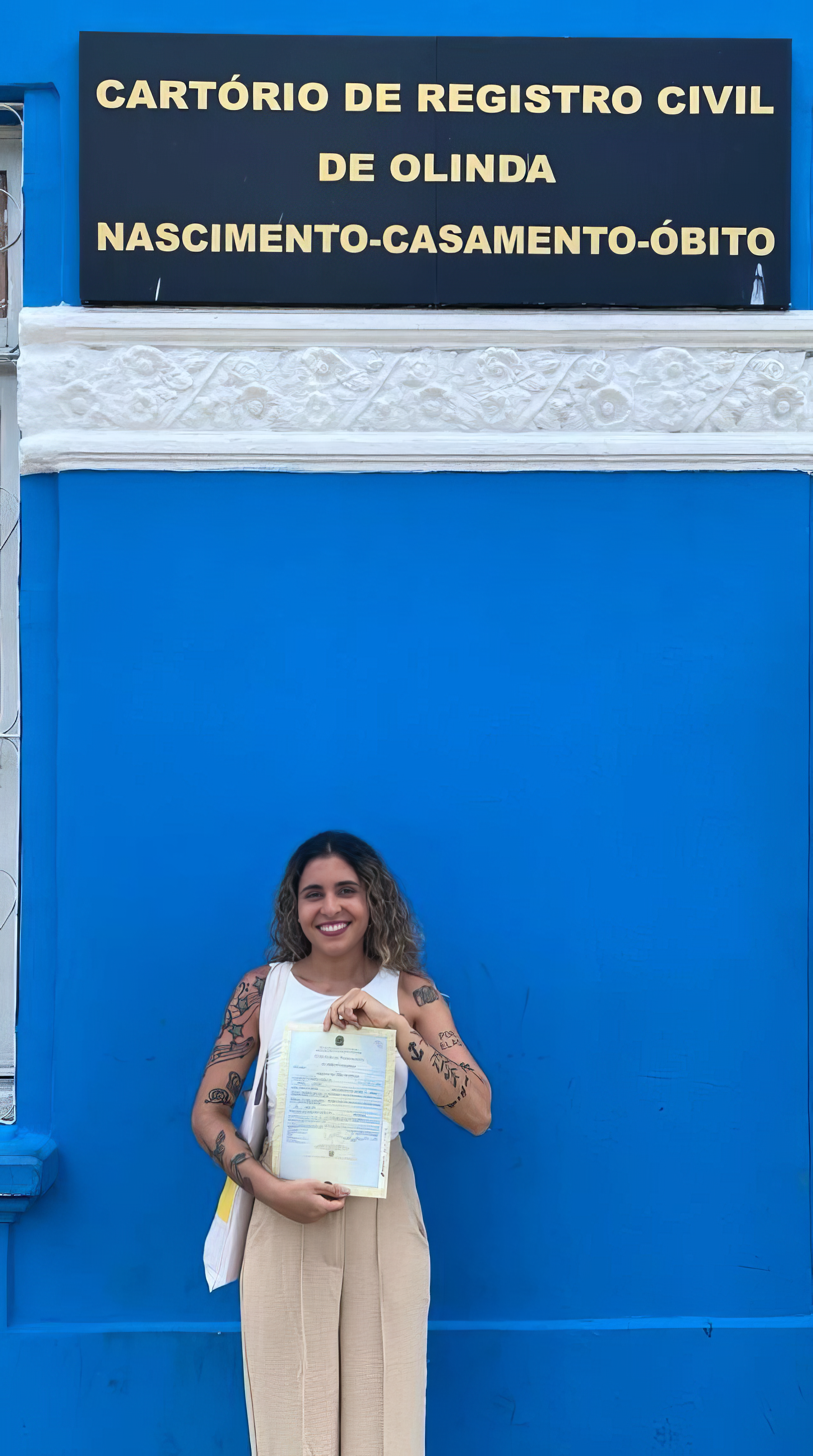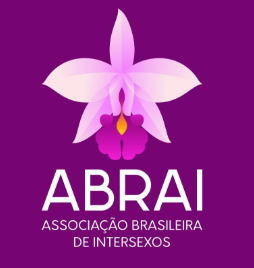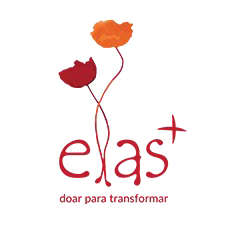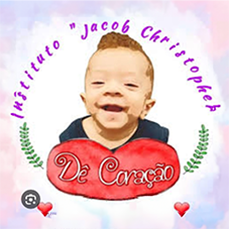Historic Victory: Céu Albuquerque, the First Person in the World to Achieve Judicial Correction of Gender to Intersex
7 de março de 2024 | Mídia internacional | por ABRAI
Photo: Personal Archive
Céu Albuquerque, a renowned intersex activist, lesbian, journalist, and photographer, diagnosed with Congenital Adrenal Hyperplasia (a genetic condition affecting cortisol production, influencing sexual development, and external genitalia formation), achieved a historic milestone by becoming the first person globally to legally change both name and gender. Her name will now officially be Céu, and the gender field on her birth certificate has been changed from female to intersex. The process, initiated in July 2021 at the 2nd Family and Civil Registry Court of Olinda by the Public Defender’s Office and lawyer and public defender Henrique da Fonte, was recently completed, marking a significant victory not only for Céu personally but for the entire global intersex community.
Céu, dedicating over a decade to intersex advocacy, tirelessly working for public policies and supporting intersex children and their families, emphasized the importance of the process’s outcome.
“The result of this process was eagerly awaited, not just as a personal achievement but as a significant milestone for the entire intersex community. Often, collective achievement is the fruit of individual struggle, and this battle was fought through me, with the hope for a better future for these children,” emphasized Céu. “Moreover, being able to include the name Céu in my documents is very special to me. This name has been part of my identity since I was 19, when my first girlfriend affectionately nicknamed me. I never fully identified with my registered name; it was often mispronounced, and I was frequently treated as male due to it being a non-binary name. So, correcting my name now will bring a significant sense of peace going forward,” she concluded.
In childhood, Céu underwent genital reassignment surgery due to ambiguous genitalia resulting from congenital adrenal hyperplasia, a controversial practice widely seen by the intersex community as a form of mutilation. Despite the challenges faced, Céu has emerged as one of the leading global advocates for the intersex cause.
“I see this moment as historic, where we can finally submit projects to ensure that every intersex child born in the national territory can be registered as intersex and that aesthetic surgeries are definitively prohibited,” states Céu. This ensures the right to integrity for these children and prevents human rights violations through these procedures.
The intersex cause advocates for the rights and dignity of individuals born with sexual characteristics that do not fit traditional male or female standards. These biological variations may include ambiguous genitals, atypical sex chromosomes, differences in hormonal production, and alterations in the female and male reproductive systems. It is estimated that approximately 11% of the world’s population may be considered intersex, with over 150 variations of intersex states already studied.
This cause is complex and faces stigma and discrimination from birth or upon the discovery of intersex traits. Human rights violations begin early with unnecessary and non-consensual medical interventions on intersex infants and children.
The stigmatization and human rights violations faced by intersex infants, children, adolescents, adults, and the elderly are extensive, including a lack of access to citizenship rights. This encompasses everything from issuing birth certificates to denying inclusion of the CPF (Brazilian Social Security Number) in records, refusing maternity benefits to mothers of intersex babies, non-issuance of the Unified Health System (SUS) card, issuing death certificates with non-matching gender, and violations in accessing health, physical, and psychological integrity.
These issues go beyond a mere struggle for the acceptance of sexual diversity. They encompass health procedures considered free from torture and mistreatment, as well as the right to equality and non-discrimination, as highlighted by Santos-Campos (2020). Therefore, the fight for the intersex cause not only seeks to respect gender identity and autonomy but also aims for a society that ensures full rights and dignity for all individuals, regardless of their sexual characteristics.
The intersex movement seeks to raise awareness in society about the natural diversity of sexual variations and promote respect for the human rights, autonomy, and bodily integrity of these individuals. It also aims to prohibit invasive and non-consensual medical practices, such as surgeries and hormonal treatments, carried out without proper understanding and consent.
“When I was born in 1991, I went six months without a birth certificate, waiting for the karyotype test to determine my body’s gender prevalence. I see this as the first human rights violation I suffered. After finally having my registration and being recorded as female, I underwent genital mutilation because neither society nor my parents could accept the existence of a baby with ambiguous genitalia, even though it was a healthy baby,” recounts Céu.
This favorable outcome was only possible with the assistance of ABRAI’s (Brazilian Intersex Association) advocacy service, which provided an opinion to the prosecution, explaining the term and importance of the intersex agenda. As this is a relatively unknown subject, this opinion was extremely important.
“ABRAI has always been very important to me. Years ago, when I met Thaís Emília, an intersex woman and president, this partnership was fundamental in my activist and scientific movement. So, this victory is for ABRAI as well, and everyone who is part of the board, in addition to strengthening Thaís’s fight, which gained much strength when her son Jacob, a baby with Noonan syndrome and intersex, was born. So, this victory is also for Jacob, who, before passing away, and his family faced various violence just because his existence challenged gender binary norms,” emphasizes Céu.
Céu’s victory is a significant step for the intersex community and a reminder of the ongoing need for public policies and inclusive practices that respect and celebrate human diversity.
Updated birth certificate, now indicating intersex.
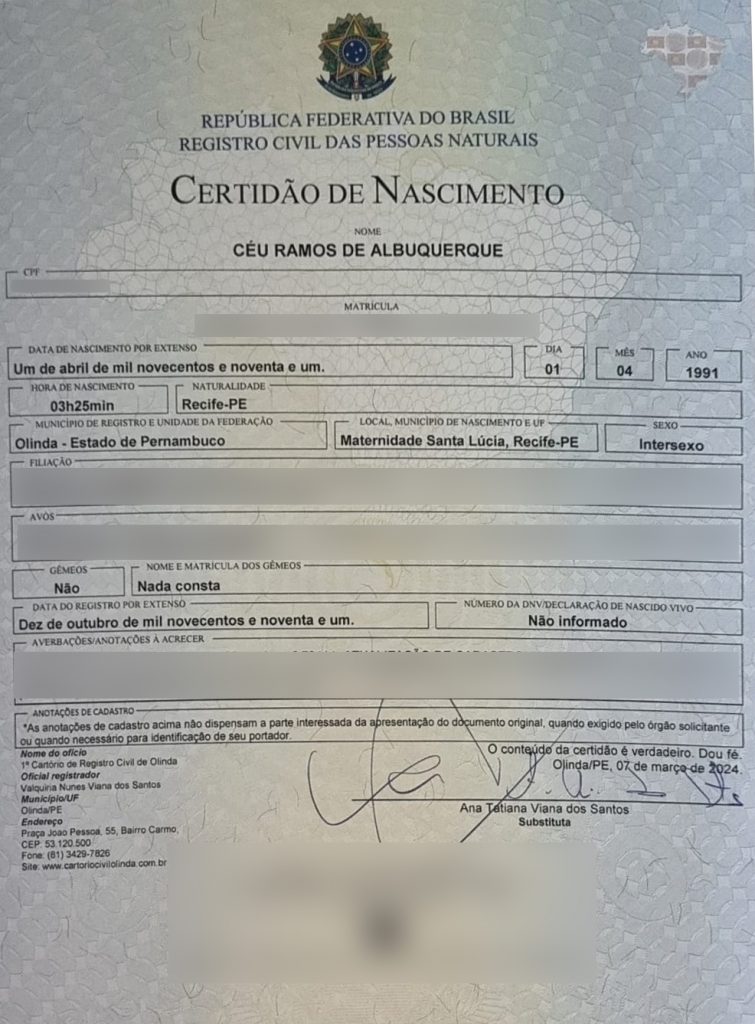
The fight for the rights of intersex individuals has been a long and challenging journey, marked by significant victories and ongoing obstacles. Here is a timeline of some of the most important milestones:
2003: The Intersex Organization International (OII) was founded, pioneering intersex activism. In the same year, International Intersex Visibility Day was institutionalized on October 26, commemorating the first public demonstration by intersex people that occurred on this day in 1996 in Boston, USA, during a Conference of the American Academy of Pediatrics.
2020: The UN convened a technical meeting on intersex issues with medical professionals and highlighted that the Declaration calls for an end to mutilating and normalizing practices, such as genital surgeries, psychological treatments, and other medical interventions, as well as non-consensual sterilization of intersex individuals.
2021: Several countries began reviewing policies regarding non-consensual intersex surgeries. In March 2021, Germany passed legislation prohibiting surgeries on intersex infants.
2021: In early August 2021, Brazil’s National Council of Justice (CNJ) authorized intersex children, born without male or female sex defined, to be registered with “undetermined” gender on their birth certificates. The change became effective nationwide on September 12, 2021.
2023: On July 6, 2023, proposals to end surgeries on intersex infants were approved at the National Health Conference by President Luiz Inácio Lula da Silva, represented by Walter Mastelaro and Ana Amorim.
2023: September 26, the birthday of baby Jacob, is sanctioned as Awareness Day against Child Mutilation. It is also filed as the National Day against Child Genital Mutilation by Deputy Duda Salabert.
These milestones represent significant advances in the fight for the rights of intersex individuals. However, there is still much work to be done to ensure equal rights and full acceptance of intersex people in society. The struggle continues, and each step forward is a victory for the intersex community.
Follow Céu on Social Media:
Personal Profile: Céu 🏳️🌈 (@ceuramosalbuquerque) • Fotos e vídeos do Instagram
Activism Profile: Intersexualizando (@intersexualizando) • Fotos e vídeos do Instagram
Work Profile: Céu (@ceuderamos) • Fotos e vídeos do Instagram
Apoie a ABRAI
Para manter os seus canais de informação, oferecer cursos e palestras ou ajudar diretamente pessoas Intersexo em situação de fragilidade física e psicológica, a ABRAI precisa de fundos. Veja como ajudar.

